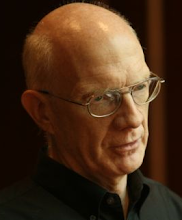—Benjamin Franklin
"Bacon is proof that God loves us... well, a whole lot more than He loves pigs."
—Robert Anderson
 This past Tuesday morning I also got proof that God has a great sense of ironic humor. I was approaching what is consistently the most dangerous intersection on my morning commute, and it was approached by the most dangerous kind of driver, in the most dangerous kind of vehicle, doing the most dangerous activity, and...
This past Tuesday morning I also got proof that God has a great sense of ironic humor. I was approaching what is consistently the most dangerous intersection on my morning commute, and it was approached by the most dangerous kind of driver, in the most dangerous kind of vehicle, doing the most dangerous activity, and...The distracted housewife in the SUV with a cellphone clamped to the side of her head at the four-yield traffic circle stopped, made eye contact, and (just for good measure) waved me through.
It took me a half a block to grasp the kind of joke God was playing on me, upending all my stereotypes in one fell swoop. I appreciated it so that I laughed out loud. As a religious person, I would generally consider myself more of a Diest than a Theist, even though I am pretty faithful Lutheran (but that's mainly because I love to sing in the choir). The rest of religion—all the stories, all the doctrine—are just stuff that people have made up in a vain attempt to explain the unexplainable. (Not that there aren't some good stories.) And there are some things (like the "resurrection of the body" that wraps up the Christian Credo) that, I'm sorry, just haven't been thought through. (I mean, will I have to have dental floss and toilet paper in Heaven? Gimme a break.)
Cosmological physicists tell us that we can perceive only about four percent of the universe. Everything we can perceive of the universe, all the Earth, the Solar System, the galaxies, everything.. is just four percent of all that is. We as humans just don't have the senses to perceive the rest. Scientists have made up something called "dark matter" (I like to think of it as "the fudge factor of the universe") so that their equations will match what is observed. How is it, then, that some scientists have such faith in their miserable perceptions to loudly disavow the existence of God?
Another scientist (well, mathematician) of (ahem) note, Blaise Pascal, put it this way, (about "betting" on whether God exists) in his work Penseés:
But you must wager. It is not optional. You are embarked. Which will you choose then? Let us see. Since you must choose, let us see which interests you least. You have two things to lose, the true and the good; and two things to stake, your reason and your will, your knowledge and your happiness; and your nature has two things to shun, error and misery. Your reason is no more shocked in choosing one rather than the other, since you must of necessity choose. This is one point settled. But your happiness? Let us weigh the gain and the loss in wagering that God is. Let us estimate these two chances. If you gain, you gain all; if you lose, you lose nothing. Wager, then, without hesitation that He is.Difficult to put it better than that.
Later on in that morning ride, just for good measure, I got to bike on the rarest thing: a freshly-swept road. I mean so fresh that the little water dribble-marks from the street-sweeper were still visible on the asphalt. It was awesome. So clean and smooth.
Every once in a while, Theism tempts me away from my cooler Deistic beliefs.





No comments:
Post a Comment